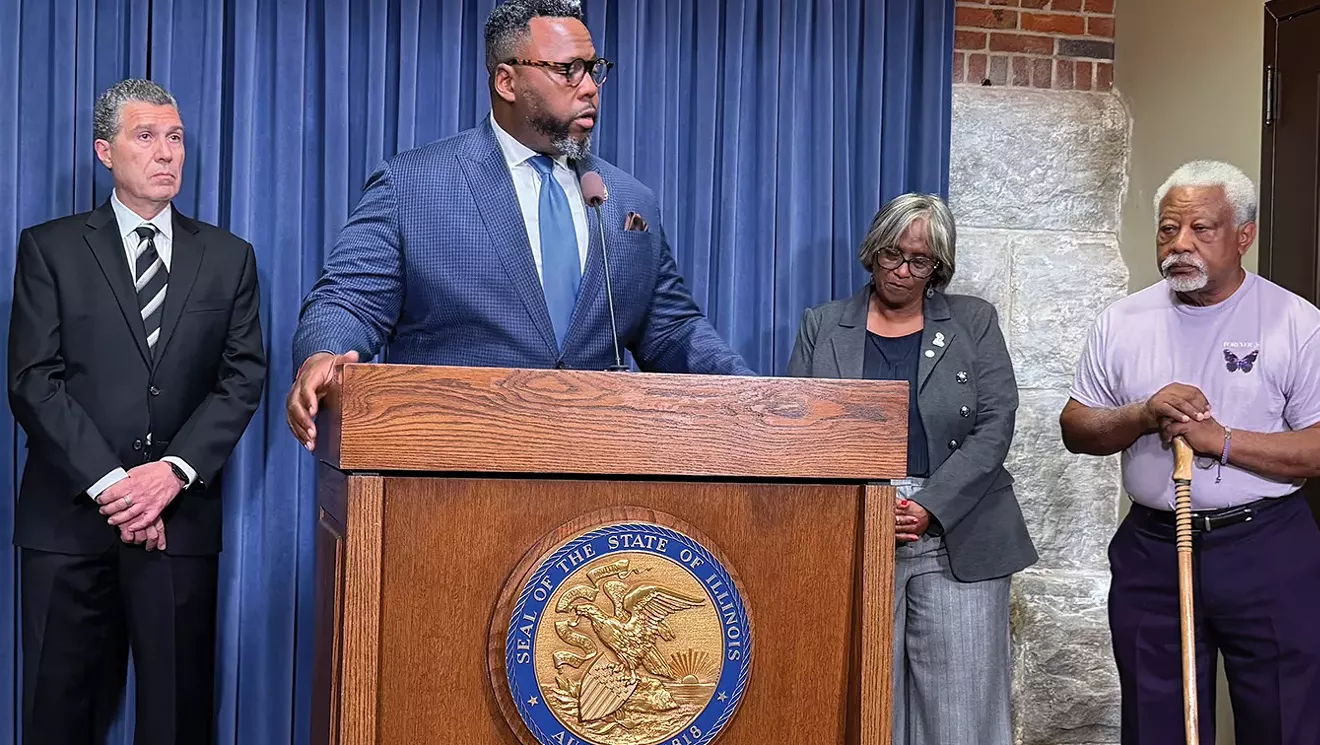
PHOTO BY SCOTT REEDER
State Rep. Kam Buckner, at podium, speaks at a Statehouse press conference May 15 following the passage of the Sonya Massey Bill. Civil rights attorney Antonio Romanucci, left, bill cosponsor state Sen. Doris Turner and Sonya Massey’s father, James Wilburn, look on.
Both chambers of the Illinois General Assembly have endorsed legislation introduced in the wake of the killing of Sonya Massey that would make it easier to learn more about problem cops before they are hired.
Proponents of the measure heading to Governor JB Pritzker’s desk, named in honor of Sonya Massey, say it may prevent future tragedies. While Pritzker is expected to sign the bill, gubernatorial spokesman Alex Gough did not immediately respond to questions.
The measure, which passed unanimously out of the Senate in April, was approved May 15 by the House on a vote of 101 to 12. The bill’s sponsors were state Sen. Doris Turner, D-Springfield, and state Rep. Kam Buckner, D-Chicago.
The legislation aims to revise police hiring procedures by requiring police departments to make thorough reviews of job applicants’ past employment. Former employers would have to make available their personnel and disciplinary records for inspection by the hiring agency prior to an offer of employment being made.
The legislation was introduced as a response to the fatal shooting of Massey by Sangamon County Sheriff’s deputy Sean Grayson, who had a checkered employment history.
Massey, who was Black, suffered a fatal gunshot wound to the head from Grayson, who is white, after Massey called 911 shortly before 1 a.m. July 6. Massey feared there was a prowler in her neighborhood and summoned deputies to her unincorporated Woodside Township home just outside Springfield city limits. The confrontation was captured on body-worn video from Grayson and another sheriff’s deputy inside Massey’s small home.
Prior to joining Sangamon County, Grayson had worked at five other central Illinois police departments in just four years, which Massey’s father, James Wilburn, has previously said should have been a “red flag,” along with Grayson’s two convictions for driving while under the influence.
“This is very difficult for me because this is not just another tragedy in my district,” Turner said. “This is one that’s very, very close to me. When I received the telephone call from Sonya Massey’s cousin, I really couldn’t believe what I was hearing. This is something that happens on television shows or something we hear about on network nightly news, not in my hometown, not involving someone that is an integral part of my life.”
Turner said her family and the Masseys have been friends for generations and that Sonya visited her home the week before her death and addressed her as “auntie.”
“I believe that Senate Bill 1953 goes a long way to prevent individuals with backgrounds such as Sean Grayson’s from ever becoming associated with law enforcement,” Turner said.
Both the Illinois Sheriffs’ Association and the Illinois Association of Chiefs of Police worked with Turner in drafting the legislation, she said.
But not everyone affiliated with law enforcement believes the proposal is a good idea. One of them is state Rep. Patrick Sheehan, R-Homer Glen. Sheehan, who was a police officer for 20 years, said in a written statement to Illinois Times that the bill was flawed.
“Illinois can’t force out-of-state employers to comply, which could block applicants with out-of-state experience. Tossing out preexisting separation agreements raises constitutional red flags, and ignoring expunged offenses disregards established legal protections,” he said.
“Even worse, a single unresponsive employer could derail an applicant’s career, no matter their qualifications. As a police officer, no one hates a bad cop more than a good cop, but for a bill that’s been in development for so long, it still feels rushed. Transparency and accountability matter, but they need more thoughtful implementation.”
However, the bill had bipartisan support overall.
State Sen. Steve McClure, a former Sangamon County prosecutor, said the legislation is a step in the right direction.
“I watched that footage like everyone else did when it was released,” the Springfield Republican said. “It was shocking footage. It was bad, bad stuff. … If you’re going to hire somebody, you want to know as much information as you can, especially when you’re putting them into such an important position as being a law enforcement officer.”
In the wake of the shooting, Grayson faces first-degree murder charges, Sangamon County has agreed to pay the Massey family $10 million and the Massey Commission was formed, in part to address systemic racism and mistrust in law enforcement.
Calvin Christian, a member of the commission, said he, too, is encouraged by the legislation.
“I personally wasn’t happy with the (lawsuit) settlement because it didn’t come with policy changes. It just came with the monetary value. I felt as though they should have arranged something where there was a local policy change in addition to the money,” Christian said. “This bill is something that I would’ve liked to have seen in the settlement.
Turner and Buckner held a press conference with Massey’s father and Antonio Romanucci, one of the civil rights attorneys representing the family, at the Capitol May 15 following the passage of the legislation.
Massey’s father told IT afterwards he doesn’t believe his daughter’s death was about racism.
“I think it’s about folks who are poor,” Wilburn said. “It didn’t matter whether they were brown or white or Black. I think Sean Grayson was just evil. He was just evil.”


